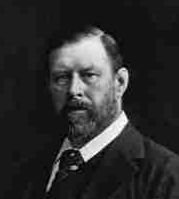This is an old revision of this page, as edited by Evice (talk | contribs) at 01:28, 13 March 2005 (En dash). The present address (URL) is a permanent link to this revision, which may differ significantly from the current revision.
Revision as of 01:28, 13 March 2005 by Evice (talk | contribs) (En dash)(diff) ← Previous revision | Latest revision (diff) | Newer revision → (diff)Abraham "Bram" Stoker (November 8, 1847–April 20, 1912) was an Irish writer, best remembered as the author of the influential horror novel Dracula.

Early life
He was born on November 8, 1847 in Clontarf in Ireland, a coastal village near Dublin. Until he was 8 years old, he was ill and could neither stand up nor walk on his own. This illness and helplessness was a traumatic experience which is noticeable in his literary work. Everlasting sleep and the resurrection from the dead, which are the central themes of his Dracula, were of great importance for him, because he was forced to spend much of his life in bed.
Not only his illness but also his total convalescence were miracles for his doctors. After that he became a normal young man, who even became an athlete and soccer-star at the University of Dublin, where he studied history, literature, mathematics and physics at Trinity College. He was also auditor of the Historical Society. He became a civil servant, a work that couldn't satisfy him. So he started to work as a journalist and as a drama critic (The Evening Mail). His interest in theatre lead to a lifelong friendship with the actor Henry Irving.
Stoker married Oscar Wilde's former girlfriend Florence Balcombe in 1878 and moved with her to London where he became business manager of Irving's Lyceum Theatre, a post he held for 27 years. The collaboration with Irving was very important for Stoker. Through him he became involved in London's high society, where he met James McNeil Whistler and Sir Arthur Conan Doyle. In the course of Irving's tours he got the chance to travel around the world.
Novels

He supplemented his income by writing a large number of sensational novels, his most famous being the vampire tale Dracula which he published in 1897. Parts of it are set around the town of Whitby, where he was living at the time. Dracula is the basis of countless films and plays.
His other novels include The Snake's Pass (1890), The Jewel of Seven Stars (1903), and The Lair of the White Worm (1911).
Bram Stoker died on April 20, 1912 in London and was interred at Golders Green Crematorium, London.
Works
Novels
- The Primrose Path (1875)
- The Snake's Pass (1890)
- The Watter's Mou' (1895)
- The Shoulder of Shasta (1895)
- Dracula (1897)
- Miss Betty (1898)
- The Mystery of the Sea (1902)
- The Jewel of Seven Stars (1903)
- The Man (AKA: The Gates of Life) (1905)
- Lady Athlyne (1908)
- The Lady of the Shroud (1909)
- Lair of the White Worm (1911)
Short Story Collections
- Under the Sunset (1881)
- Snowbound (1908)
- Dracula's Guest (1914)
Uncollected Stories
- "Bridal of Dead"
- "Buried Treasures"
- "The Chain of Destiny"
- "The Crystal Cup"
- "The Dualitists; or, The Death Doom of the Double Born"
- "The Fate of Fenella"
- "The Gombeen Man"
- "In the Valley of the Shadow"
- "The Man from Shorrox'"
- "Midnight Tales"
- "The Red Stockade"
- "The Seer"
Biography
- Personal Reminiscences of Henry Irving (Two Volumes) (1906)
Non-Fiction
- The Duties of Clerks of Petty Sessions in Ireland (1879)
- A Glimpse of America (1886)
- Famous Impostors (1910)
References
See also
- Blood from the Mummy's Tomb (film adaptation of The Jewel of Seven Stars)
Online texts
- Project Gutenberg e-texts of some of Bram Stoker's works
- Bram Stoker Books in HTML format.